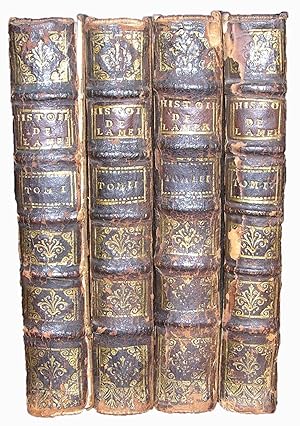Descripción
"4 volumes. 12mo., (6 ½ x 3 ¾ inches). Letterpress title pages printed in red and black in all four volumes; additional engraved title page in volume one by Jean-Baptiste Scotin (b. 1678). 2 fine folding engraved maps, one full-page map, folding view of Quebec, 9 folding plates, 15 full-page plates, 2 plates of musical notation (very slightly toned). Contemporary brown speckled calf, the spine in 6 compartments with five raised bands, gilt lettered in two and decorated in the rest (extremities a bit worn, hinges weakened). First edition. "THE EARLIEST VIEWS TAKEN IN CANADA" (Sabin). An early contemporary history of the Indian nations of Canada and their relations with the French and English, written by a French naval officer serving in Hudson's Bay and New France between 1697 and 1714. Bacqueville's epistolary account derives chiefly from his own observations of the capture of Fort Nelson and Frontenac's administration, and also summarizes the earlier stewardship of Denonville, the French establishment on the St. Lawrence, the Hudson's Bay expeditions, and the Iroquois Nation's method of making war and contracting alliances. "This work relates entirely to Canada and the Iroquois Indians; the plates comprise the earliest views taken in Canada" (Sabin). The maps include: "Carte de la Baye et Detroit d'Hudson," "Carte du Gouvernement du Montreal," and "Carte Generalle [sic] de la Nouvelle France." "Of the four volumes of the 'Histoire,' volumes I, III, and IV are in the form of letters; the first is the best written and most trustworthy. Here La Potherie is an eye witness and an excellent observer. His letters on the governments of Quebec, Trois-Rivieres, and Montreal offer a fairly complete picture of Canada. The descriptions of places and of the settlers' way of life, the notes on individuals, the statistics on population and sources of revenue show that nothing escaped La Potherie's attention and that he wanted his readers to be well informed. He notes the rivalry between Quebec and Montreal, but without stressing it. If he narrates, he does not refrain from judging. It is not to France's interest, he affirms, to keep Hudson Bay; Canadian trade would suffer. He regrets that Montreal has not been made the capital of Canada… "The purpose of volume II, which is divided into chapters and written in a less careful style, is to make known the principal Indian nations and their relations with the French colony. La Potherie had intended to go and study on the spot the problems that he tackles here. As his stat of health did not permit that, he contented himself with gathering his information from reliable witnesses: Louis Jolliet, the Jesuit missionaries, and especially Nicolas Perrot. According to Father Jules Tailhan, a Jesuit and editor of Perrot's Memoire, the latter may not only have given La Potherie verbal information but even have made accessible to him accounts that today are no longer to be found… "Volumes III and IV are devoted particularly to an account of the Iroquois wars and of the peace parleys which resulted in the general treaty of 1701. For events prior to 1698, the date of his arrival in Canada, La Potherie relied on his informants, whose statements were trustworthy, but not always complete. From 1698 to 1701, although he took no official part in the peace parleys, he followed them closely. During the summer of 1701 he was at Montreal and Sault-Saint-Louis. He also had access to documents which he quotes readily. He summarizes the speeches of Calliere and of the chiefs of the various nations" (Leon Pouliot for CNB). Field 66; Howes B23 Streeter Sale I:120; Graff 133; Bell B2; Jones 413; Leclerc 98; Lande 21; European Americana 722/10; Sabin 2692.". N° de ref. del artículo 72MMS239
Contactar al vendedor
Denunciar este artículo
![]()




